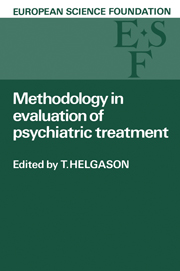 Methodology in Evaluation of Psychiatric Treatment
Methodology in Evaluation of Psychiatric Treatment Book contents
- Frontmatter
- Contents
- Participants
- Foreword
- Preface
- INTRODUCTION
- I METHODS OF CLASSIFICATION
- II EVALUATION CRITERIA
- Special Problems in Evaluation of Psychotherapy
- Special Problems in Evaluation of Milieu Therapy
- III RATING METHODS IN EVALUATION OF TREATMENT
- IV OTHER QUANTITATIVE METHODS OFEVALUATION OF TREATMENT
- V ETHICALAND PRACTICAL PROBLEMS
- Index
Special Problems in Evaluation of Milieu Therapy
from II - EVALUATION CRITERIA
- Frontmatter
- Contents
- Participants
- Foreword
- Preface
- INTRODUCTION
- I METHODS OF CLASSIFICATION
- II EVALUATION CRITERIA
- Special Problems in Evaluation of Psychotherapy
- Special Problems in Evaluation of Milieu Therapy
- III RATING METHODS IN EVALUATION OF TREATMENT
- IV OTHER QUANTITATIVE METHODS OFEVALUATION OF TREATMENT
- V ETHICALAND PRACTICAL PROBLEMS
- Index
Summary
The need for evaluation of milieu therapy
In general terms, milieu therapy can be defined as a planned treatment environment where all activities and social relations are supposed to serve a common therapeutic goal.. Within this broad, and rather vague definition, there are different types of milieu therapy, according to theoretical background, methods and goals, from ‘the therapeutic community proper’ to behaviour modification by ‘token economy’. Whereas the negative effects on patients of the traditional, custodial hospital setting have been well documented, it has been more problematic to prove the positive effects of specific types of milieu therapy. This, of course, does not necessarily imply that milieu therapy does not work, as some of the opponents seem to mean. The rather inconclusive situation shows, however, the need for more effort to be put into evaluation and for the development of evaluation methods in this field. The present economic situation, with increasing problems in getting funding for health work, makes this need even stronger.
Components of evaluation
Milieu therapy, not being one single therapeutic method, but rather a variety of treatment programmes consisting of different components, may be evaluated according to the same guidelines as for health programmes in general. The-main components are the following, referring to WHO publications:
(a) relevance
(b) progress
(c) effectiveness
(d) efficiency
(e) impact.
(a) Relevance relates to the rationale for having programmes, or services and institutions, in terms of their response to essential human needs and health policies and priorities.
(b) Progress is concerned with the comparison of the actual with the scheduled programme delivery, the identification of reasons for achievements or shortcomings, and indications for remedies for any shortcomings. The purpose of a progress review is to facilitate the monitoring and operational control of on -going activities. In the terms of systems analysis it is a review of the use of ‘inputs’.
(c) Effectiveness is an expression of the desired effect of a programme, service or institution in reducing a health problem or improving an unsatisfactory health situation. Thus, effectiveness measures the degree of attainment of the pre-determined objectives and targets of the programme, service or institution. The assessment of effectiveness is aimed at improving programme formulation or the functions and structure of health service and institutions through analysis of the extent of attainment of their objectives.
- Type
- Chapter
- Information
- Methodology in Evaluation of Psychiatric TreatmentProceedings of a Workshop Held in Vienna 10–13 June 1981, pp. 137 - 148Publisher: Cambridge University PressPrint publication year: 1983


